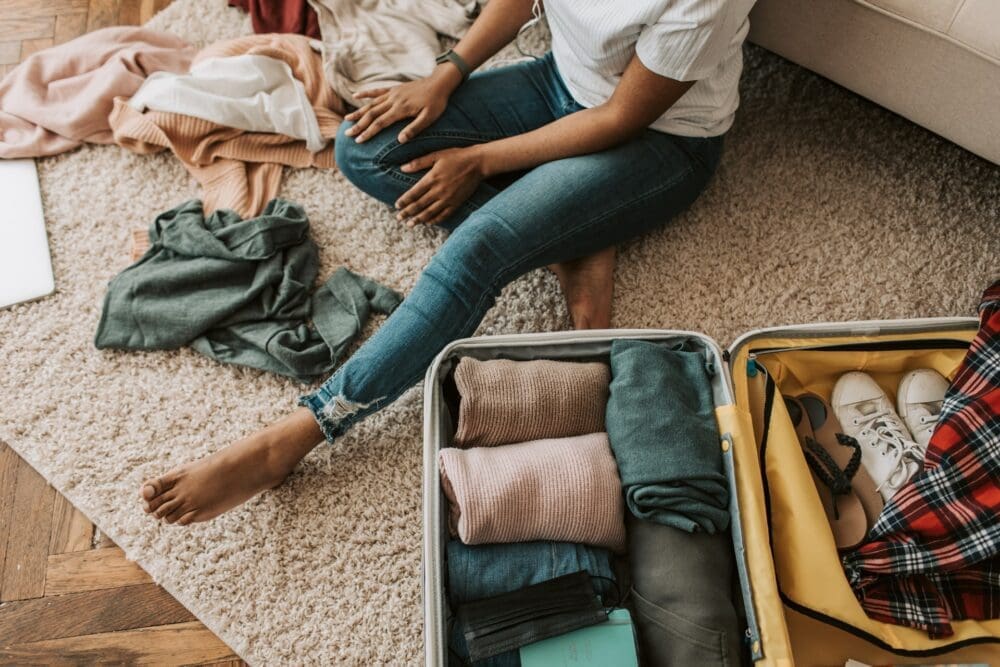Do you think you’re ready for that once-in-a-lifetime trip? Whether it’s for study abroad, an international internship, professional experience abroad, or just a well-deserved beach vacation on an exotic island, the amount of planning you do before boarding the plane will make a significant difference in your trip.
Take the time now to prepare and plan so that you can get the most out of your stay abroad. Worrying over why your phone won’t connect to a foreign network sounds like a lot more fun than wandering through side alleyways and eating local specialties.
Photo by Gabriela Palai
Here’s a checklist of things to remember before travelling to the airport to help you get ready:
Passport
You’ll need a place to store your colourful stamps from all over the world before you can start collecting them. Start applying for passports several months before your journey, especially if you want visas from foreign embassies. While the passport application procedure is usually straightforward, bureaucratic issues might cause things to take much longer than expected.
Most likely, you’ll have to apply in person at a passport agency near you. Prepare to show proof of citizenship, an additional form of identification, and recent photocopies of documents. Before you go in to fill out the application, double-check with your local office for specific criteria or look for it online.
Make a couple of copies of the front page of your passport as soon as you get it. Take one copy with you on your trip and leave the other with someone you can trust at home. If your passport gets lost or stolen during your trip, this will come in handy in the worst-case scenario.
Also, if you already have a passport, make sure it’s up to date! Your U.S. passport must be valid for at least six months after your return date in most countries. You should renew your passport at least nine months before it expires, according to the State Department.
The passport application will take 10 to 12 weeks to be processed. If you need your passport sooner, pay an additional charge for expedited service and have your passport in four to six weeks.
Visa
The technicalities of obtaining a visa differ for every nation, but the primary line is that it is time-consuming and laborious.
Find out if your intended destination requires a visa by doing some research. If that’s the case, what kind of visa will you require? Sixty percent of nations in the world require visas for any length of stay, with most of these being regular visitor visas.
If you plan on studying or interning for more than a semester, you may need to apply for a student visa. If you intend to work, you will require a work visa (though you may be able to work abroad without a visa, too).
Furthermore, other nations take a different approach to the above. In the United Kingdom, there are numerous tiers of visas that will depend on what activity you want to partake upon entering the country. You can apply for a working holiday visa in Australia. There are several different sorts of this necessary evil; find out which one you are eligible for.
Visas should be applied for as soon as possible. If you’re annoyed when waiting in line at the bank, consider how long it can take government agencies in multiple countries to complete a task.
The State Department’s country information updates include crucial information on your destination, such as whether you’ll need a visa and where to get one, as well as crime statistics, unique circumstances, medical information, and more.
Packing

You won’t need make-up in Nepal, your blow dryer won’t work in Madrid, your baseball glove will probably never be used in Botswana, and you can get cheap sweaters in Ecuador. Don’t overpack! Research your destination ahead of time to find out what you’ll need to pack (such as mosquito netting or tampons) and what you can buy cheaply there. Make sure you have enough room in your suitcase for souvenirs.
Invest in practical luggage; unless you plan on staying in a resort for the duration of your vacation, you’ll most likely be doing a lot of walking (at least on weekend getaways!). Get a robust backpack that you can easily carry around, whether you’re going through the crowded streets of London or the dense forests of Brazil.
If you’re indeed planning to stay at the resort for most of the time, it might be worth investing in 2835 led strips that will make your room look fancier.
Learn how to communicate with your house.
Even if you’re going on a trip to get away from it all, knowing your alternatives for communicating with friends and family back home is always a bright idea. It’s also wonderful to phone Mom and Pop and let them know you’ve arrived on the other side of the seas.
This is now easier than ever before, thanks to current technologies. Try out free services that you can use from anywhere in the world if you have an internet connection (such as Skype or WhatsApp). Check your cell phone plan; some can be activated in foreign countries, but the majority will not. If you don’t like the thought of buying and carrying around a phone card, look into your phone’s SIM card capabilities.
Customs and Import Restrictions
When it comes to what you can bring into and take out of a country, you’ll find that different countries have different policies. You must be familiar with these before you arrive, and you can double-check with the foreign embassy of any country you’re visiting. Typical limitations include (but are not limited to):
- Gold and other precious metals
- Currency
- Religious objects made of ivory
- Skins of animals
- Antiques
- When you arrive, any electronic equipment that hasn’t been declared will be confiscated.
- Stones, both precious and semi-precious
- Produce that is in season
- Wooden objects that have not been treated
- Even if they are prescribed, certain drugs might be dangerous.
Travellers who do not follow a country’s customs and import laws risk confiscating their items and being punished. Prison sentences may be imposed in some more extreme cases.
There are also limitations on what you can carry back with you when you return to the United States. These regulations were put in place to implement laws enacted by numerous agencies, including the United States Fish and Wildlife Service.
The vast majority of coral objects, whether in the form of jewellery or pieces, the majority of crocodile or caiman leather, leather goods and wild bird feathers, furs from marine mammals, furs from a spotted cat are some of them.
Who doesn’t want to flaunt their international travel experiences? I hope the knowledge of these things will help you plan your international trip and provide you with a smooth experience while travelling. Now get your documents ready and start travelling!
References:
https://www.neamb.com/travel-and-vacations/7-things-you-must-do-before-your-next-international-trip
https://upgradedpoints.com/travel/helpful-tips-before-traveling-abroad/
https://www.savoredjourneys.com/50-things-every-international-traveler-know/


